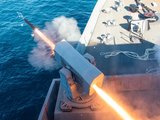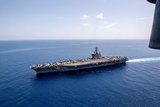New phase of Greek P-3B upgrade
Lockheed Martin has been awarded a contract to continue the modernisation and upgrade of Greece’s P-3B Orion aircraft.
The contract modification for the mid-life upgrade of four Greek P-3B aircraft represents the next phase of an original contract confirmed in February 2016 worth $141 million.
Worth $260 million, the latest modification also includes $59.5 million in FMS funds obligated at the time of the award.
Planned upgrades will extend the service life of each aircraft by 15,000 flight hours and involves structural upgrades, including the integration of Rockwell Collins' Flight2 avionics system, to return the aircraft to service with the
Already have an account? Log in
Want to keep reading this article?
More from Naval Warfare
-
![European navies line up $105.8 billion in unawarded contracts for 2026]()
European navies line up $105.8 billion in unawarded contracts for 2026
France, Germany and Italy lead the way on unawarded naval defence opportunities that could be awarded this year, but across Europe countries are ramping up their spending efforts to face geopolitical challenges.
-
![Spain’s F100 upgrade mirrors Aegis modernisation paths in allied navies]()
Spain’s F100 upgrade mirrors Aegis modernisation paths in allied navies
The Spanish Navy’s Alvaro de Bazan-class of air defence frigates will receive the latest Aegis Weapon System technology among other modernisations to extend the service life to 2045.
-
![UK’s Fleet Solid Support ship programme deemed on track despite steel supply concerns]()
UK’s Fleet Solid Support ship programme deemed on track despite steel supply concerns
Shipbuilders are saying the programme is going ahead on time as the government estimates 7.7 million tonnes of steel are needed for 2026 infrastructure projects.
-
![Raytheon unveils details of its proposal for the US Navy/NATO ESSM Next Significant Variant]()
Raytheon unveils details of its proposal for the US Navy/NATO ESSM Next Significant Variant
In an exclusive interview with Shephard, Raytheon’s VP of Shipboard Missiles disclosed what improvements the company plans to offer for the Sea Sparrow NSV.























